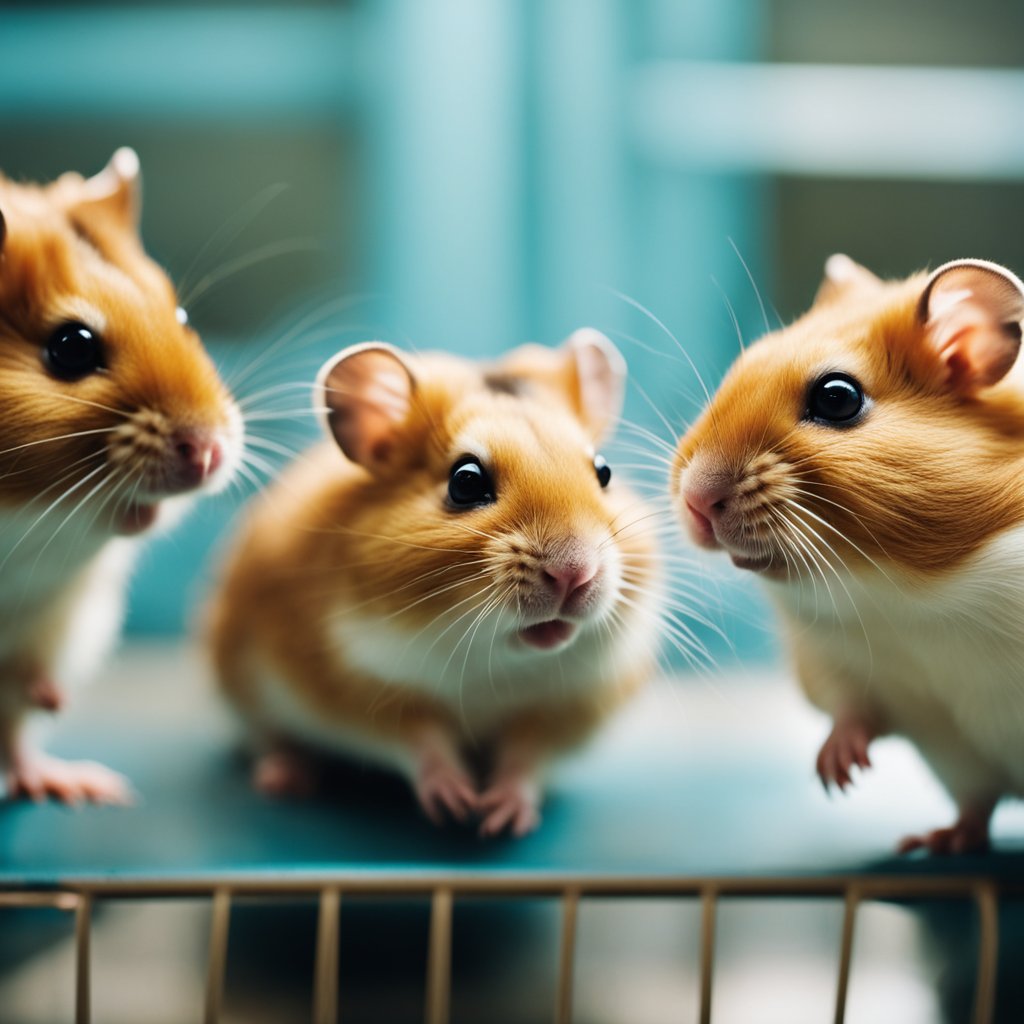Do Hamsters Get Hungry? Understanding the Eating Habits of Hamsters
Do hamsters get hungry? As a responsible pet owner, it is important to understand the basic needs of your pet. One of the most fundamental needs of any living creature is food. But how do you know when your hamster is hungry?
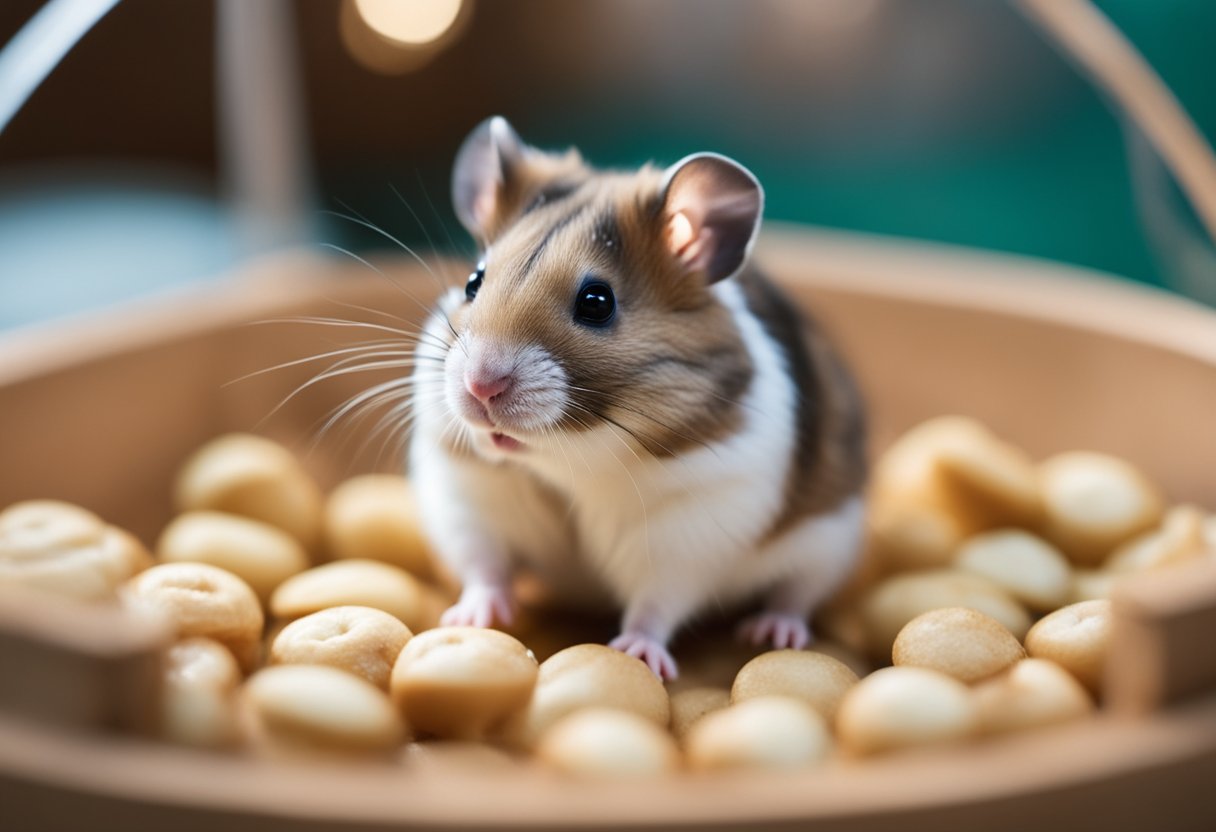
Hamsters are known for their love of food. In fact, they can eat up to 20% of their body weight each day! However, just because they are always ready to eat, it doesn’t mean they are always hungry. Hamsters have a natural instinct to store food for later, so they may not show signs of hunger even if they haven’t eaten for a while.
Understanding Hamster Hunger: To understand if your hamster is hungry, you need to observe their behavior. Signs of hunger in hamsters include being more active and restless than usual, searching for food, and even begging for food. You may also notice that your hamster is losing weight, which could be a sign that they are not getting enough food.
Feeding Your Hamster: To keep your hamster healthy and happy, it is important to feed them a balanced diet. Hamsters need a variety of foods, including fresh vegetables, fruits, and high-quality pellets. You should also provide fresh water at all times. Overfeeding your hamster can lead to obesity and other health problems, so it is important to follow feeding guidelines and monitor their weight.
Key Takeaways
- Hamsters have a natural instinct to store food, so they may not always show signs of hunger.
- Signs of hunger in hamsters include being more active and restless than usual, searching for food, and even begging for food.
- To keep your hamster healthy and happy, provide a balanced diet and monitor their weight to avoid overfeeding.
Understanding Hamster Hunger
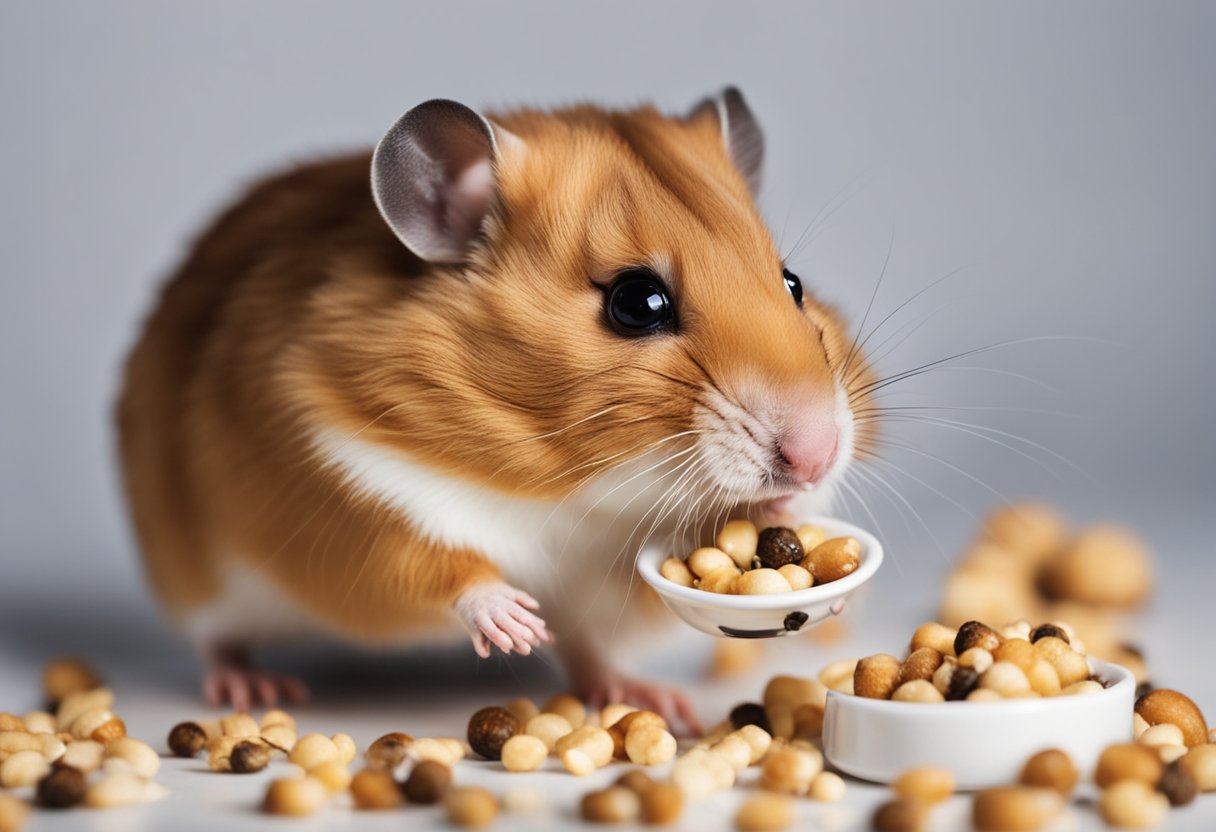
Hamsters are small, active animals that require a balanced diet to remain healthy. Feeding them a proper diet is essential to keep them from getting hungry. In this section, we will discuss the dietary needs of hamsters and the signs of hunger in hamsters.
Hamster Dietary Needs
Hamsters are omnivorous animals, which means they require a diet that contains both plant and animal sources of nutrition. They need a diet that is high in protein, fiber, and low in fat. A diet that is too high in fat can lead to obesity, which can cause a range of health problems for your hamster.
Hamsters require a diet that is high in protein to help them build and maintain muscle. Good sources of protein for hamsters include lean meats, eggs, and insects. They also need a diet that is high in fiber to help with digestion and to prevent constipation. Good sources of fiber for hamsters include fresh fruits and vegetables, hay, and other plant-based foods.
Signs of Hunger in Hamsters
It is important to know the signs of hunger in hamsters to ensure that they are getting enough food. Some of the signs of hunger in hamsters include:
- Lethargy: Hamsters that are hungry may become lethargic and have less energy than usual.
- Weight loss: If your hamster is losing weight, it may be a sign that it is not getting enough food.
- Increased aggression: A hungry hamster may become more aggressive than usual, especially if it smells food.
- Biting: A hungry hamster may start biting, especially if it smells food.
- Eating non-food items: If your hamster is hungry, it may start eating non-food items such as bedding or toys.
In conclusion, hamsters require a balanced diet to remain healthy and avoid getting hungry. A diet that is high in protein and fiber and low in fat is essential for their health. Knowing the signs of hunger in hamsters is important to ensure that they are getting enough food.
Feeding Your Hamster
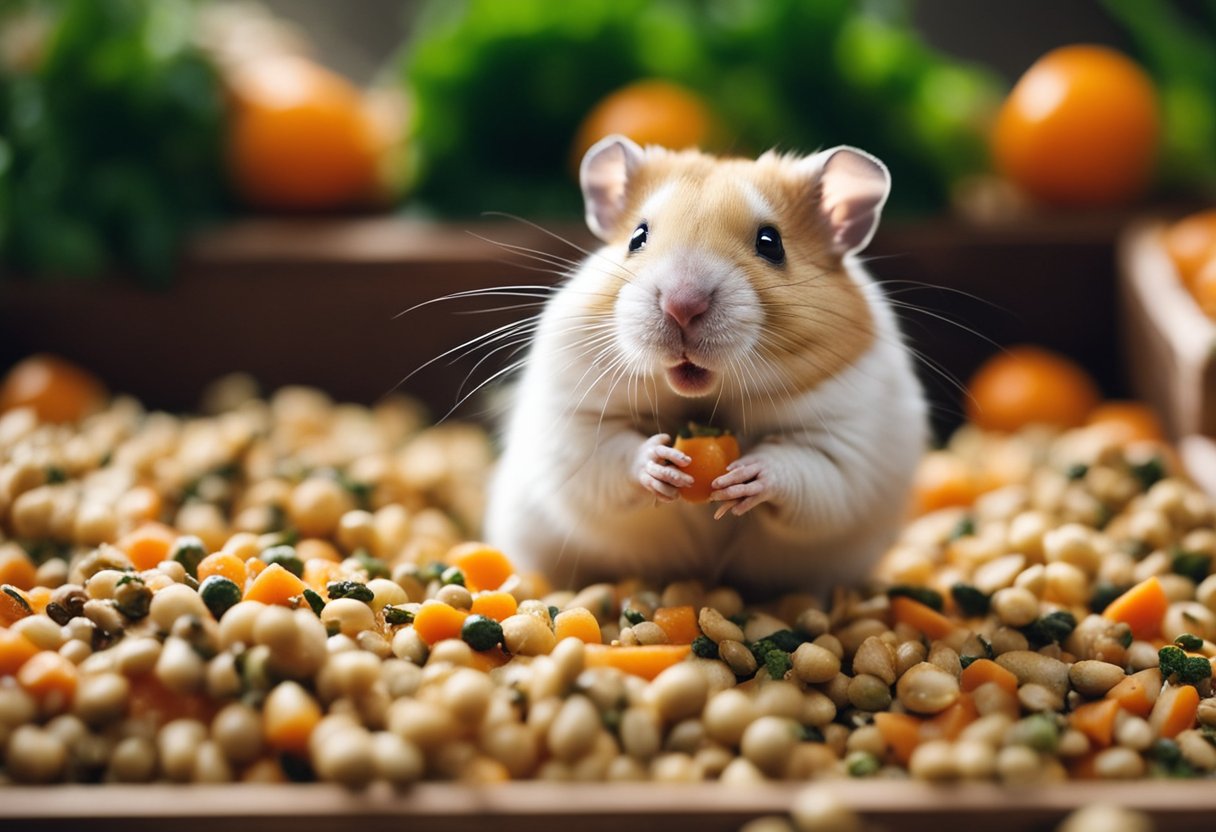
When it comes to feeding your hamster, there are some best practices you should follow to ensure they are getting the proper nutrition they need. Additionally, there are common feeding mistakes that you should avoid to keep your hamster healthy.
Best Practices for Feeding
- Feed your hamster once a day: Hamsters are small animals and do not require a lot of food. Overfeeding can lead to obesity and other health problems. Most hamsters will need no more than 2 tablespoons of pelleted food every 24 hours. Dwarf hamsters will need a bit less, roughly 1 tablespoon, while larger hamsters, like Syrians, will likely need a bit more.
- Give them a variety of foods: While it may be tempting to stick to one type of food, it’s important to give your hamster a variety of foods to ensure they are getting all the nutrients they need. A good hamster diet should consist of a mix of pellets, fresh vegetables, and occasional treats like seeds or nuts.
- Provide fresh water daily: Make sure your hamster has access to fresh water at all times. You can use a water bottle or a water dish, but make sure to clean it daily to prevent bacteria growth.
Common Feeding Mistakes
- Overfeeding: As mentioned earlier, overfeeding can lead to obesity and other health problems. Make sure to measure out the appropriate amount of food for your hamster and avoid giving them too many treats.
- Feeding the wrong foods: Some foods can be harmful to your hamster’s health. Avoid giving them sugary or fatty foods, as well as foods that are toxic to hamsters such as chocolate, onions, and garlic.
- Not providing enough variety: Just like humans, hamsters can get bored with the same food every day. Make sure to provide a variety of foods to keep your hamster interested in their diet.
By following these best practices and avoiding common feeding mistakes, you can ensure your hamster is getting the proper nutrition they need to stay healthy and happy.
Resources
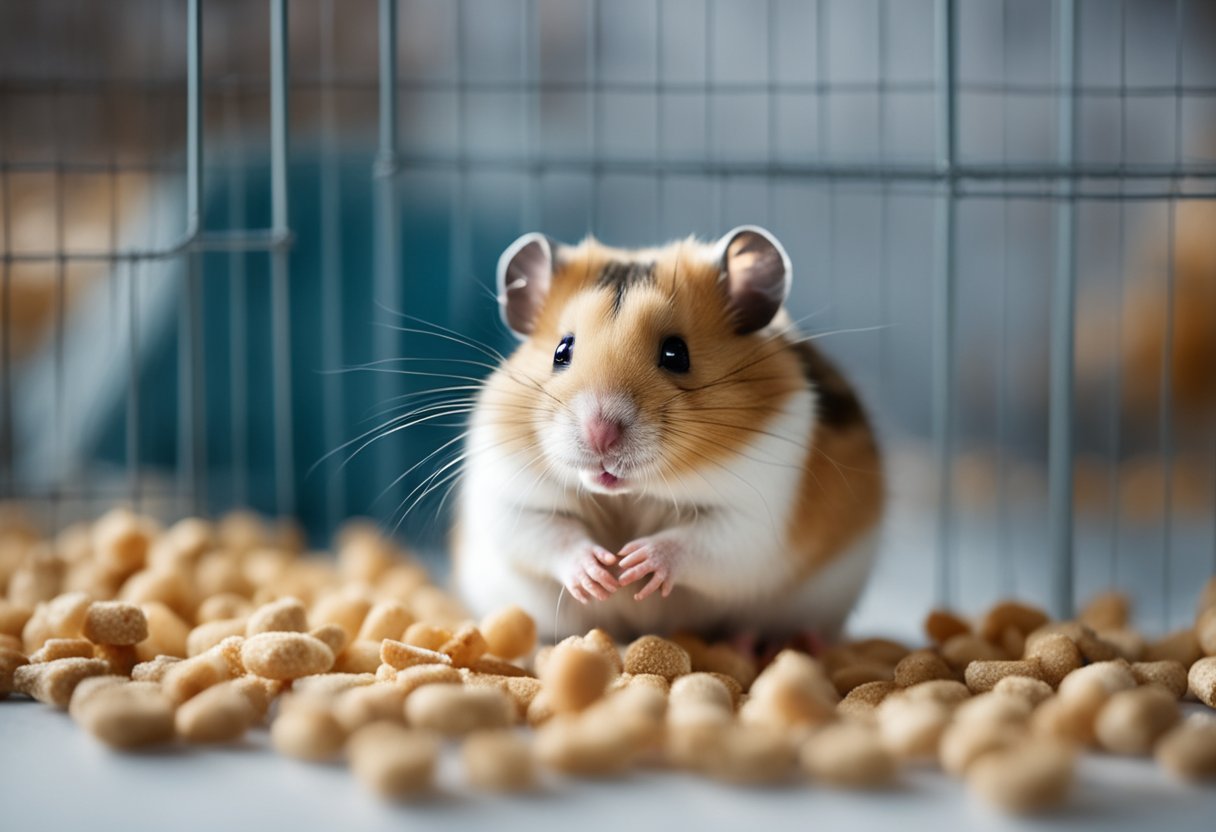
If you’re a new hamster owner, it’s natural to have questions about your pet’s food and hunger levels. Fortunately, there are many resources available to help you understand your hamster’s dietary needs and behavior.
One of the best ways to learn about hamster nutrition is to consult with a veterinarian who specializes in small animals. They can provide you with expert advice on what to feed your hamster, how much to feed them, and how often to feed them. They can also answer any questions you may have about your hamster’s hunger levels.
There are also many online resources available to help you learn about hamster nutrition and behavior. A quick search online will yield many articles and blog posts on the subject. Some of the most helpful resources include the websites of reputable pet stores and animal welfare organizations.
When it comes to feeding your hamster, it’s important to provide them with a balanced diet that includes a variety of foods. Hamsters are omnivores, which means they eat both plant and animal matter. You can provide your hamster with a commercial hamster mix that contains a variety of seeds, grains, and pellets, as well as fresh fruits and vegetables.
It’s also important to monitor your hamster’s food intake and adjust their diet as needed. Hamsters have a tendency to overeat, which can lead to health problems such as obesity and diabetes. You can help prevent these issues by providing your hamster with appropriate portion sizes and limiting their access to high-calorie treats and snacks.
Overall, by staying informed and providing your hamster with a healthy, balanced diet, you can help ensure that they stay happy and healthy for years to come.
Conclusion
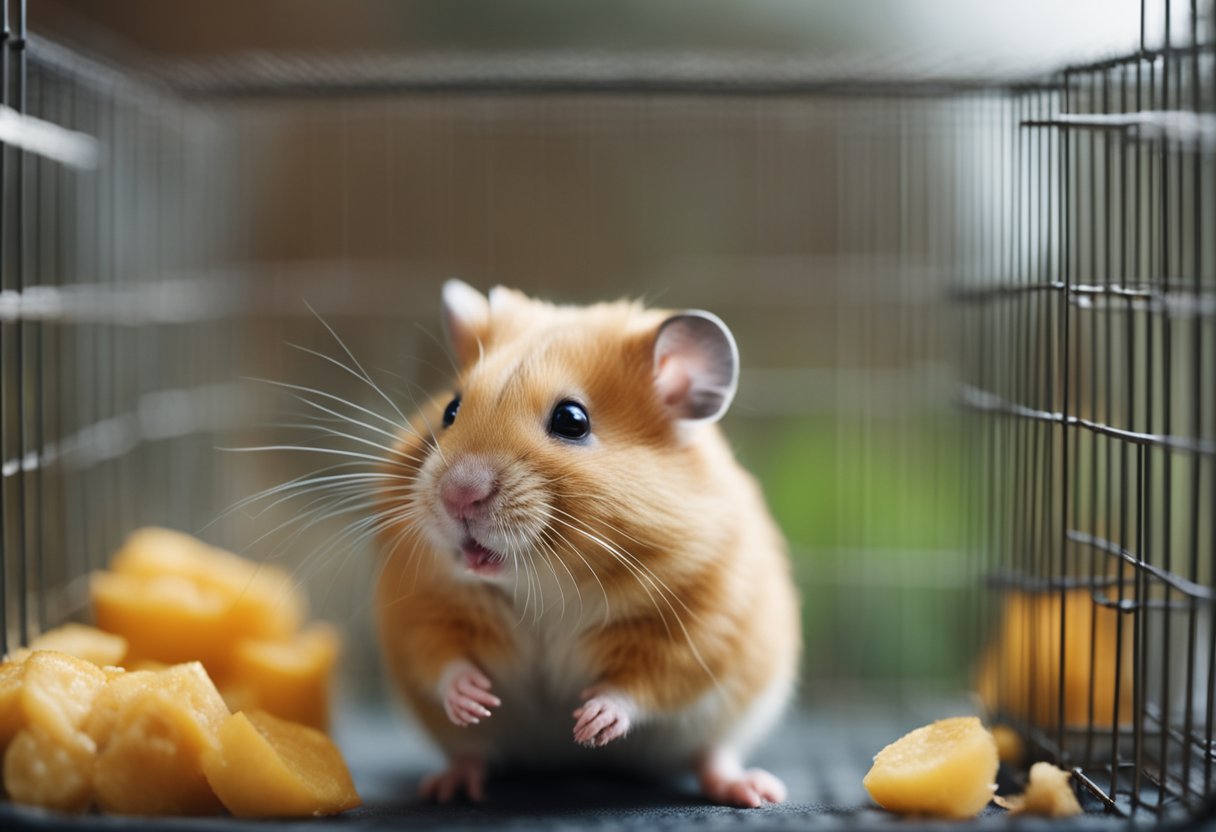
In conclusion, hamsters do get hungry and require a consistent feeding schedule to maintain their health. As a responsible pet owner, it is important to provide your hamster with a balanced diet that includes a variety of foods such as pellets, fresh fruits and vegetables, and occasional treats.
Remember to always check the nutrition content of any food you give to your hamster and avoid excessive sugars and fats. A food with at least 12-15% protein content and around 6-10% fiber content is ideal for your hamster’s digestion and overall health.
It is also important to provide fresh water to your hamster daily and clean their food and water dishes regularly to prevent the growth of harmful bacteria.
By following these simple guidelines and being attentive to your hamster’s needs, you can ensure that your furry friend stays happy and healthy for years to come.
Frequently Asked Questions
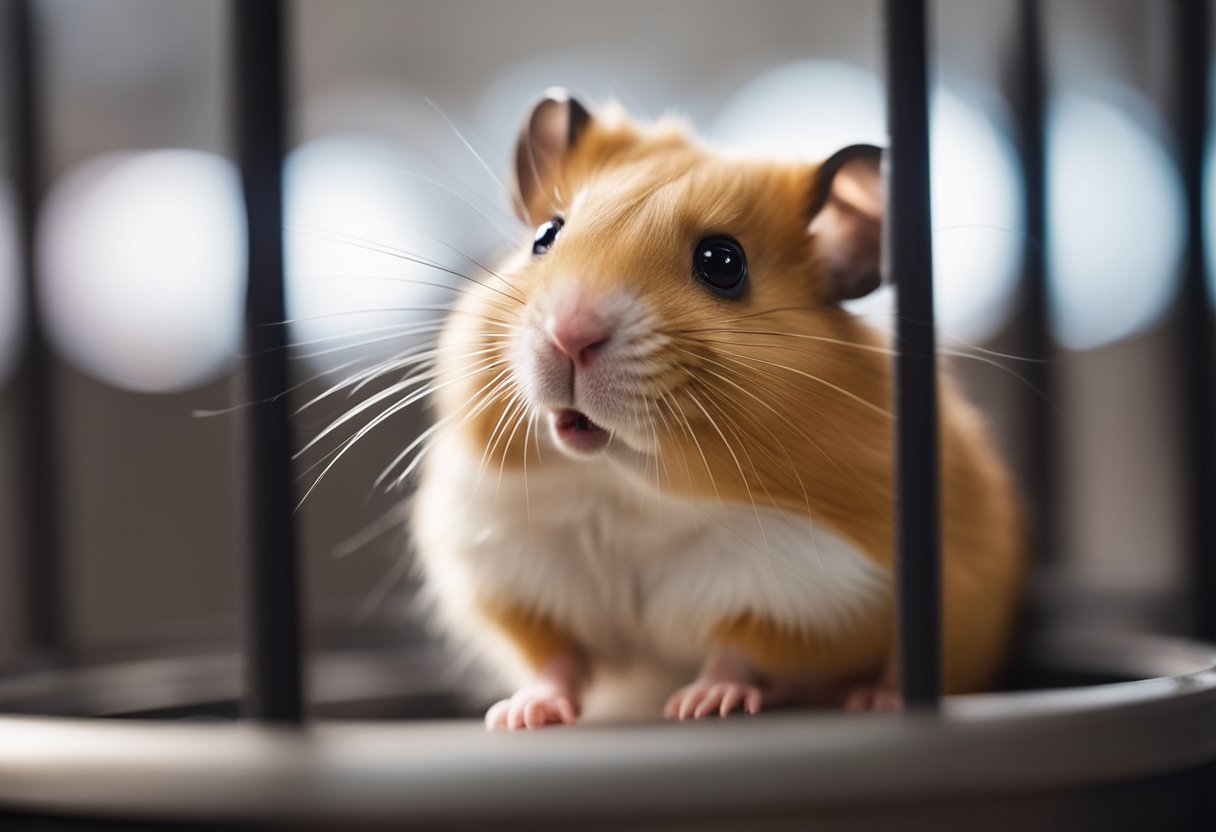
How often should hamsters be fed to ensure they remain healthy?
Hamsters should be fed daily to ensure they remain healthy. It is recommended that you feed your hamster once a day, preferably in the evening. Overfeeding can lead to obesity, so be sure to monitor your hamster’s food intake and adjust the amount accordingly.
What are the dietary needs of Syrian hamsters?
Syrian hamsters require a diet rich in protein, fiber, and vitamins. A good quality hamster mix that contains a variety of seeds, grains, and pellets is recommended. You can also supplement your hamster’s diet with fresh fruits and vegetables, but be sure to avoid feeding them citrus fruits, onion, garlic, and other foods that are toxic to hamsters. Syrian hamsters also need access to clean, fresh water at all times.
What are some common foods that are unsafe for hamsters to consume?
Hamsters should not be fed chocolate, caffeine, alcohol, or any other foods that are toxic to them. They should also avoid sugary and fatty foods, as these can lead to obesity and other health problems. Additionally, hamsters should not be fed foods that are high in salt or spices, as these can upset their digestive system.
What alternatives can I offer my hamster if I temporarily run out of its regular food?
If you temporarily run out of your hamster’s regular food, you can offer them a small amount of fresh fruits and vegetables. Some good options include carrots, broccoli, apples, and bananas. You can also offer your hamster a small amount of cooked, unseasoned chicken or egg as a source of protein.
Why might a hamster exhibit constant signs of hunger?
If your hamster is exhibiting constant signs of hunger, it may be due to a lack of food or an inadequate diet. Be sure to provide your hamster with a balanced diet that meets their nutritional needs. If your hamster continues to exhibit signs of hunger, it may be a sign of an underlying health problem, and you should consult with a veterinarian.
What are the consequences of not providing a hamster with adequate food?
Not providing a hamster with adequate food can lead to a variety of health problems, including malnutrition, obesity, and dental problems. In severe cases, it can even lead to death. It is important to provide your hamster with a balanced diet that meets their nutritional needs to ensure their health and well-being.
